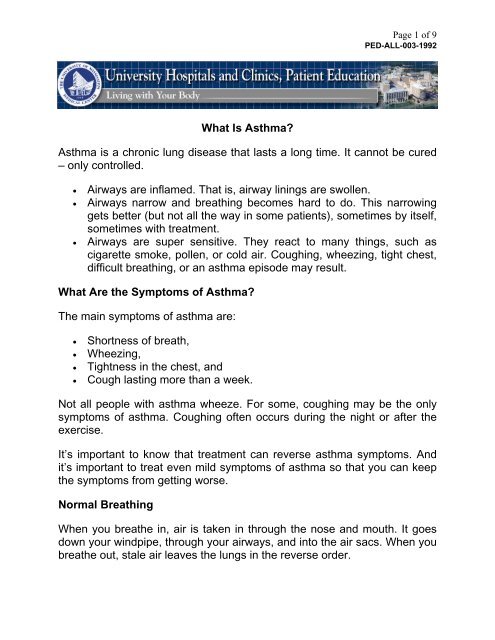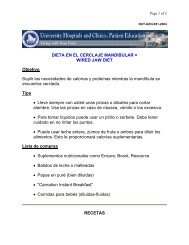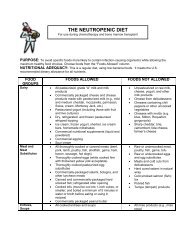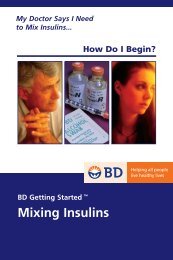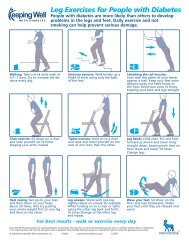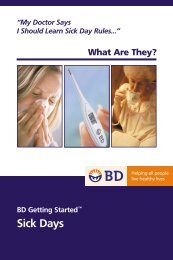What Is Asthma? - Rowland Medical Library - University of ...
What Is Asthma? - Rowland Medical Library - University of ...
What Is Asthma? - Rowland Medical Library - University of ...
Create successful ePaper yourself
Turn your PDF publications into a flip-book with our unique Google optimized e-Paper software.
<strong>What</strong> <strong>Is</strong> <strong>Asthma</strong>?<br />
Page 1 <strong>of</strong> 9<br />
PED-ALL-003-1992<br />
<strong>Asthma</strong> is a chronic lung disease that lasts a long time. It cannot be cured<br />
– only controlled.<br />
• Airways are inflamed. That is, airway linings are swollen.<br />
• Airways narrow and breathing becomes hard to do. This narrowing<br />
gets better (but not all the way in some patients), sometimes by itself,<br />
sometimes with treatment.<br />
• Airways are super sensitive. They react to many things, such as<br />
cigarette smoke, pollen, or cold air. Coughing, wheezing, tight chest,<br />
difficult breathing, or an asthma episode may result.<br />
<strong>What</strong> Are the Symptoms <strong>of</strong> <strong>Asthma</strong>?<br />
The main symptoms <strong>of</strong> asthma are:<br />
• Shortness <strong>of</strong> breath,<br />
• Wheezing,<br />
• Tightness in the chest, and<br />
• Cough lasting more than a week.<br />
Not all people with asthma wheeze. For some, coughing may be the only<br />
symptoms <strong>of</strong> asthma. Coughing <strong>of</strong>ten occurs during the night or after the<br />
exercise.<br />
It’s important to know that treatment can reverse asthma symptoms. And<br />
it’s important to treat even mild symptoms <strong>of</strong> asthma so that you can keep<br />
the symptoms from getting worse.<br />
Normal Breathing<br />
When you breathe in, air is taken in through the nose and mouth. It goes<br />
down your windpipe, through your airways, and into the air sacs. When you<br />
breathe out, stale air leaves the lungs in the reverse order.
<strong>What</strong> Happens During an Episode <strong>of</strong> <strong>Asthma</strong>?<br />
Page 2 <strong>of</strong> 9<br />
<strong>Asthma</strong> affects the airways in your lungs. During an episode <strong>of</strong> asthma:<br />
• The lining <strong>of</strong> the airways becomes swollen (inflamed).<br />
• The airways produce a thick mucus.<br />
• The muscles around the airways tighten and make the airways<br />
narrower.<br />
These changes in the airways block the flow <strong>of</strong> air, making it hard to<br />
breathe.<br />
You need to know the ways that asthma affects the airways so that you can<br />
understand why it <strong>of</strong>ten takes more than one medicine to treat the disease.<br />
Very simply, some medicines relax the airways and others reduce (and<br />
even prevent) the swelling and mucus.<br />
<strong>What</strong> Causes <strong>Asthma</strong>?<br />
The basic cause <strong>of</strong> asthma is not yet known. <strong>What</strong> we do know is that<br />
asthma is not caused by emotional factors such as troubled parent-child<br />
relationship. In short, asthma is not "all in one’s head". It is instead a<br />
chronic lung disease.<br />
<strong>What</strong> Causes <strong>Asthma</strong> Episodes?<br />
People with asthma have airways that are super sensitive to things that do<br />
not bother people who do not have asthma. These things are called<br />
triggers because when you are near or come in contact with them, they<br />
may start an asthma episode. Your airways may become swollen, produce<br />
too much mucus, and tighten up. Common triggers for asthma episodes<br />
include the following:<br />
• Dander (or flakes) from the skin, hair, or feathers <strong>of</strong> all warm-blooded<br />
pets (including dogs, cats, birds, and small rodents)<br />
• House dust mites<br />
• Cockroaches<br />
• Pollens from grass and trees and mold<br />
• Mold (indoor and outdoor)<br />
• Cigarette smoke; wood smoke; scented products such as hair spray,<br />
cosmetics, and cleaning products; strong odors from fresh paint or<br />
cooking; automobile fumes; and air pollution<br />
• Infections in the upper airway, such as colds (a common trigger for<br />
both children and adults)
• Exercise<br />
• Showing strong feelings (crying, laughing)<br />
• Changes in weather and temperature<br />
<strong>Is</strong> There a Cure for <strong>Asthma</strong>?<br />
Page 3 <strong>of</strong> 9<br />
<strong>Asthma</strong> cannot be cured, but it can be controlled. You should expect<br />
nothing less.<br />
How Can <strong>Asthma</strong> Episodes Be Prevented?<br />
To prevent asthma episodes you will have to work closely with your doctor<br />
to:<br />
• Develop a medicine plan that keeps you from getting symptoms.<br />
• Plan ways to avoid or reduce contact with your triggers.<br />
How Are <strong>Asthma</strong> Episodes Controlled?<br />
To control asthma episodes when they occur, you will have to work out a<br />
medicine plan with your doctor that includes:<br />
• Treating symptoms early,<br />
• Doing the right things for any changes in symptoms, and<br />
• Knowing when a doctor’s help is needed and seeking help right away.<br />
<strong>What</strong> Can a Patient with <strong>Asthma</strong> Expect From<br />
Treatment?<br />
With proper treatment most people with asthma will be<br />
able to:<br />
• Be active without having asthma symptoms. this<br />
includes participating in exercise and sports.<br />
• Sleep through the night without having asthma<br />
symptoms.<br />
• Prevent asthma episodes (attacks).<br />
• Have the best possible peak flow number – lungs<br />
that work well<br />
• Avoid side effects from asthma medicines.
Warning Signs <strong>of</strong> <strong>Asthma</strong> Episodes<br />
Page 4 <strong>of</strong> 9<br />
<strong>Asthma</strong> episodes rarely occur without warning. Most people with asthma<br />
have warning signs (physical changes) that occur hours before symptoms<br />
appear. Warning signs are not the same for everyone. You may have<br />
different signs at different times. By knowing your warning signs and acting<br />
on them, you may be able to avoid a serious episode <strong>of</strong> asthma.<br />
• Think back on your last asthma episode. Did you have any signs<br />
below?<br />
• Check your warning sign(s). Show them to your doctor and family.<br />
• Remember to follow your asthma control plan as soon as these signs<br />
appear.<br />
o Drop in peak flow reading<br />
o Chronic cough, especially at night<br />
o Difficulty breathing<br />
o Chest starts to get tight or hurts<br />
o Breathing faster than normal<br />
o Getting out <strong>of</strong> breath easily<br />
o Tired<br />
o Itchy, watery, or glassy eyes<br />
o Itchy, scratchy, or sore throat<br />
o Stroking chin or throat<br />
o Sneezing<br />
o Head stopped up<br />
o Headache<br />
o Fever<br />
o Runny nose<br />
o Change in face color<br />
o Dark circles under eyes<br />
o Other:________________________________<br />
My most common warning signs <strong>of</strong> an asthma episode are:<br />
1. _______________________________________________________<br />
2. _______________________________________________________<br />
3. _______________________________________________________
<strong>Asthma</strong> Trigger Control Plan<br />
Page 5 <strong>of</strong> 9<br />
Because you have asthma, your airways are very sensitive. They may<br />
react to things called triggers (stimuli that can cause asthma episodes).<br />
Your airways may become swollen, tighten up, and produce excess mucus<br />
in the presence <strong>of</strong> one or more <strong>of</strong> the triggers below. These triggers may<br />
make asthma symptoms worse or keep you from getting better. It’s<br />
important to find out what your asthma triggers are. Learn ways to avoid<br />
them. If you cannot avoid triggers, and your medicine plan does not work<br />
as well as you and your doctor think it should, you both should discuss<br />
allergy shots (immunotherapy).<br />
• Ask your doctor to help you find out what your triggers are.<br />
• Ask your doctor for help in deciding which actions will help the most<br />
to reduce your asthma symptoms.<br />
• Number each action item in order <strong>of</strong> importance. Carry out these<br />
actions first. Once you have completed these actions, move on to<br />
actions that are <strong>of</strong> lesser importance.<br />
• Discuss the results <strong>of</strong> these efforts with your doctor.<br />
Pollens and Molds (Outdoor)<br />
� Stay indoors during the midday and afternoon when the pollen count<br />
is high.<br />
� Use air conditioning, if possible.<br />
� Keep windows closed during seasons when pollen and mold are<br />
highest.<br />
� Avoid sources <strong>of</strong> molds (wet leaves, garden debris).<br />
House Dust Mites<br />
These are actions you should take to gain control <strong>of</strong> dust mites:<br />
� Encase your mattress and box spring in an airtight cover.<br />
� Either encase your pillow or wash it once a week every week.<br />
� Avoid sleeping or lying on upholstered furniture.<br />
� Remove carpets that are laid on concrete.<br />
� Wash your bed covers, clothes, and stuffed toys once a week in hot<br />
(130° F) water.
Page 6 <strong>of</strong> 9<br />
These actions will also help you gain control <strong>of</strong> dust mites – but they<br />
are not essential:<br />
� Reduce indoor humidity to less than 50 percent. Use a dehumidifier if<br />
needed.<br />
� Remove carpets from your bedroom.<br />
� Use chemical agents to kill mites or to change mite’s antigens in the<br />
house.<br />
� Avoid using a vacuum, one or more <strong>of</strong> the following things can be<br />
done to reduce the amount <strong>of</strong> dust you breathe in.<br />
o Use a dust mask<br />
o Use a central vacuum cleaner with the collecting bag outside the<br />
home.<br />
o Use a vacuum cleaner that has powerful suction.<br />
Animal Dander (or flakes – from the skin, hair, or feathers <strong>of</strong> all warmblooded<br />
pets including dogs, cats, birds, and rodents). There are no<br />
such things as an allergen-free dog. The length <strong>of</strong> a pet’s hair does<br />
not matter. The allergen is in the saliva, urine, and dander.<br />
� Remove the animal from the house or school classroom.<br />
� If you must have a pet, keep the pet out <strong>of</strong> your bedroom at all times.<br />
� If there is a forced-air heating in the home with a pet, close the air<br />
ducts in your bedroom.<br />
� Wash the pet weekly.<br />
� Avoid visits to friends or relatives with pets.<br />
� Take asthma medicine (cromolyn or beta2-agonist ; cromolyn is <strong>of</strong>ten<br />
preferred) before visiting homes or sites where animals are present.<br />
� Choose a pet without fur or feathers (such as a fish or a snake).<br />
� Avoid products made with feathers, for example, pillows and<br />
comforters. Also avoid pillows, bedding, and furniture stuffed with<br />
kapok (silky fibers from the seed pods <strong>of</strong> the silk-cotton tree).<br />
� Use a vacuum cleaner fitted with a HEPA (high-efficiency particulate<br />
air) filter.<br />
Cockroach Allergen<br />
� Use insect sprays; but have someone else spray when you are<br />
outside <strong>of</strong> the home.<br />
� Air out the home for a few hours after spraying.<br />
� Use roach traps.
Indoor Molds<br />
Page 7 <strong>of</strong> 9<br />
� Keep bathrooms, kitchens, and basements well aired.<br />
� Clean bathrooms, kitchens, and basements regularly.<br />
� Do not use humidifiers.<br />
� Use dehumidifiers for damp basement areas, with humidity level set<br />
for less than 50 percent but above 25 percent. Empty and clean unit<br />
regularly.<br />
Tobacco Smoke<br />
� Do not smoke<br />
� Do not allow smoking in the home.<br />
� Have household members smoke outside.<br />
� Do not allow any smoking in your bedroom. Encourage family<br />
members to quit smoking. Their doctor can help them quit.<br />
� Use an indoor air-cleaning device (for smoke, mold, and dander).<br />
Wood Smoke<br />
� Avoid using a wood burning heat stove to heat your home. The<br />
smoke increases lower respiratory symptoms.<br />
� Avoid using kerosene heaters.<br />
Strong Odors and Sprays<br />
� Do not stay in your home when it is being painted. Allow enough time<br />
for the paint to dry.<br />
� Avoid perfume and perfumed cosmetics such as talcum powder and<br />
hair spray.<br />
� Do not use room deodorizers.<br />
� Use nonperfumed household cleaning products whenever possible.<br />
� Reduce strong cooking odors (especially frying) by using a fan and<br />
opening windows.<br />
� Avoid air pollution by staying indoors on days when the pollution<br />
count is high.<br />
Colds and Infections<br />
� Avoid people with colds or the flu.<br />
� Get rest, eat a balanced diet, and exercise regularly.<br />
� Talk to your doctor about flu shots.<br />
� Do not take over-the-counter cold remedies, such as antihistamines<br />
and cough syrup, unless you speak to your doctor first.
Exercise<br />
Page 8 <strong>of</strong> 9<br />
� Work out a medicine plan with your doctor that allows you to exercise<br />
without symptoms.<br />
� Take inhaled beta2-agonist or cromolyn medicine before exercising.<br />
� Warm up before doing exercise and cool down afterwards.<br />
Weather<br />
� Wear a scarf over your mouth and nose in cold weather.<br />
� Pull a turtleneck over your nose on windy or cold days.<br />
� Dress warmly in the winter or on windy days.<br />
REMEMBER: Making these changes will help keep asthma episodes<br />
from starting. An asthma trigger control plan is an important part <strong>of</strong><br />
controlling asthma.<br />
Summary <strong>of</strong> Steps to Manage <strong>Asthma</strong> Episodes<br />
• Know your warning signs and peak flow zones so you can begin<br />
treatment early.<br />
• Take the correct amount <strong>of</strong> medicine at the times the doctor has<br />
stated. If the asthma control plan includes increased dosage or a<br />
second medicine to be used during episodes, take it as prescribed.<br />
Always call your doctor if you need to take more medicine than the<br />
doctor ordered.<br />
• Remove yourself or the child from the trigger if you know what it<br />
is. Treatment does not work as well if the patient stays around the<br />
trigger.<br />
• Keep calm and relaxed. Family members must stay calm and<br />
relaxed too.<br />
• Rest.<br />
• Observe yourself or the child by noting changes in body signs such<br />
as wheezing, coughing, trouble breathing, and posture. If you have a<br />
peak flow meter, measure peak flow number 5 to 10 minutes after<br />
each treatment to see if peak flow is improving.<br />
• Review the list below for signs to seek emergency medical care<br />
for asthma. They include:<br />
o Your wheeze, cough, or shortness <strong>of</strong> breath gets worse, even<br />
after the medicine has been given and had time to work. Most
Page 9 <strong>of</strong> 9<br />
inhaled bronchodilator medicines produce an effect within 5 to 10<br />
minutes. Discuss the time your medicines take to work with your<br />
doctor.<br />
o Your breathing gets difficult. Signs <strong>of</strong> this are:<br />
• Your chest and neck are pulled or sucked in with each breath.<br />
• You are hunching over.<br />
• You are struggling to breathe.<br />
o You have trouble walking or talking<br />
o You stop playing or working and cannot start again.<br />
o Your lips or fingernails are gray or blue. If this happens, Go to<br />
the Emergency Room Now!<br />
• Keep your important information for seeking emergency care<br />
handy.<br />
• Call a family member, friend, or neighbor to help you if needed.<br />
• Immediately call a clinic, doctor’s <strong>of</strong>fice, or hospital for help if<br />
needed.<br />
Do Not Do the Following:<br />
o Do not drink a lot <strong>of</strong> water. Just drink normal amounts.<br />
o Do not breathe warm moist air from a shower.<br />
o Do not rebreathe into a paper bag held over the nose.<br />
o Do not use over-the-counter cold remedies without first calling<br />
the doctor.<br />
From:<br />
Teach Your Patients About <strong>Asthma</strong>: A Clinician's Guide<br />
National <strong>Asthma</strong> Education Program<br />
National Institutes <strong>of</strong> Health<br />
1992<br />
Pediatrics Dept. Division <strong>of</strong> Allergy, The <strong>University</strong> <strong>of</strong> Mississippi <strong>Medical</strong> Center<br />
2500 North State St.<br />
Jackson, MS 39216-4505<br />
The <strong>University</strong> <strong>of</strong> Mississippi <strong>of</strong>fers equal opportunity in education and employment, M/F/D/V.


